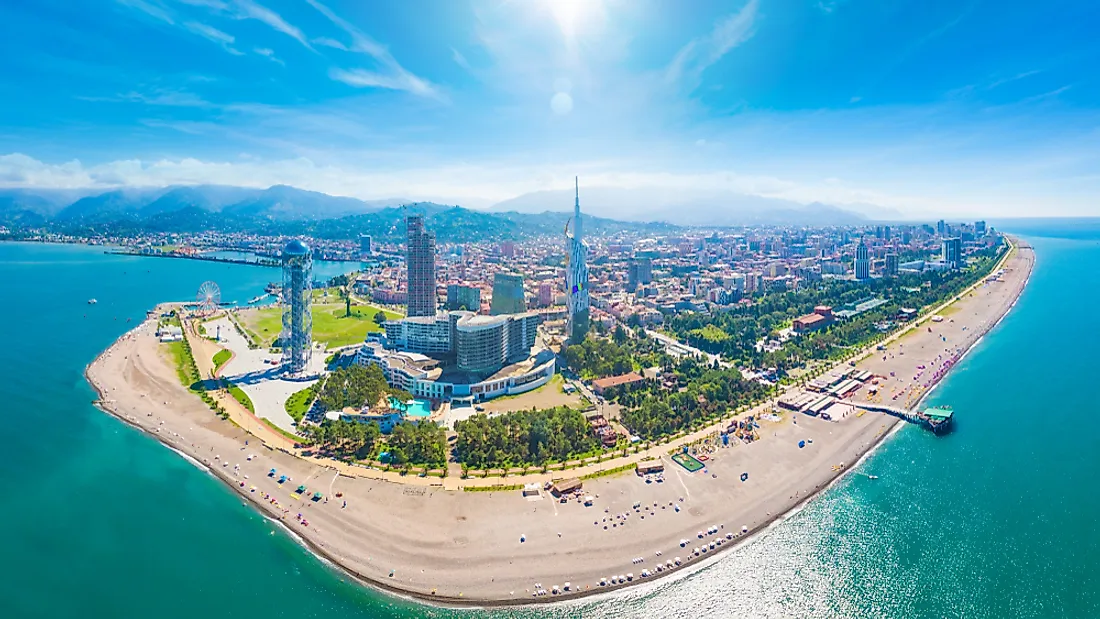Is Adjara a Country?

Adjara is not a country, but rather is a political-administrative, geographical, and historical region of Georgia. Officially named the Autonomous Republic of Adjara, the region is located in southwestern Georgia, along coast of the Black Sea, just north of Turkey. Adjara is an important tourist destination in Georgia, and the republic's capital, Batumi, is the country's second largest city. The status of the Autonomous Republic of Adjara is defined by Georgian law and the region's constitution. Adjara encompasses an area of approximately 1,110 sq mi and has an estimated population of 336,077 people.
Brief History
Adjara has been part of the Kingdom of Iberia and Colchis since antiquity. Adjara fell under Rome during the second century BC, was colonized by Greece in the fifth century BC, and became part of the Kingdom of Abkhazia in the eighth century. After being conquered by the Ottoman Empire in 1614, all inhabitants of Adjara were converted to Islam. In 1878, the Ottomans ceded the region to the Russian Empire, and it was temporarily occupied by British and Turkish forces from 1918 to 1920, before becoming part of the Democratic Republic of Georgia in 1920. Following a brief conflict, the government of Ankara ceded Adjara to Georgia on March 1921, through the Treaty of Kars.
Adjara After the Soviet Union's Dissolution
After the Soviet Union was dissolved in 1991, Adjara became part of an independent but politically divided Republic of Georgia. The region avoided the civil war and chaos that afflicted the rest of Georgia from 1991 to 1993, primarily because of leader Aslan Abashidze's authoritarian rule. The Georgian government had little input in the decisions made in Adjara while President Eduard Shevardnadze was in office, although this changed once Shevardnadze was ousted after the Rose Revolution of 2003. Shevardnadze was replaced by Mikheil Saakashvili, whose national government tried to impose control over the region, ultimately resulting in the 2004 Adjara crisis. Saakashvili's ultimata and protests against Adjara's leadership forced Abashidze to resign in 2004. Following Abashidze's resignation, the Georgian government introduced a new law that redefined Adjara's autonomy. Levan Varshalomidze succeeded Aslan Abashidze as leader of Adjara.
Government and Law
The status of Adjara's autonomy is defined by Georgia's law on Adjara and the region's new constitution, which was adopted after Aslan Abashidze, the region's leader, was ousted in 2004. The President of Georgia nominates the head of Adjara's government, but also has the authority to dissolve that government and assembly. Additionally, Georgia's president can overrule local authorities on matters that contradict Georgia's constitution.
Demographics of Adjara
Adjara had an estimated population of 333,953 in 2014. The indigenous population of Adjara are an ethnographic group of people who speak various local dialects that are collectively referred to as Adjarian. The people of Adjara were previously referred to as "Muslim Georgians" until the Soviet Union's 1926 census listed them as "Ajars." Since then, the people of Adjara are referred to as Georgians since the Soviet census did not ask about religion. Additionally, referring to the population as "Muslim Georgians" would be incorrect since over 70% of Adjarans are now Christian. Other ethic population groups in Adjara include Abkhaz, Pontic Greek, Armenian, and Russian.











